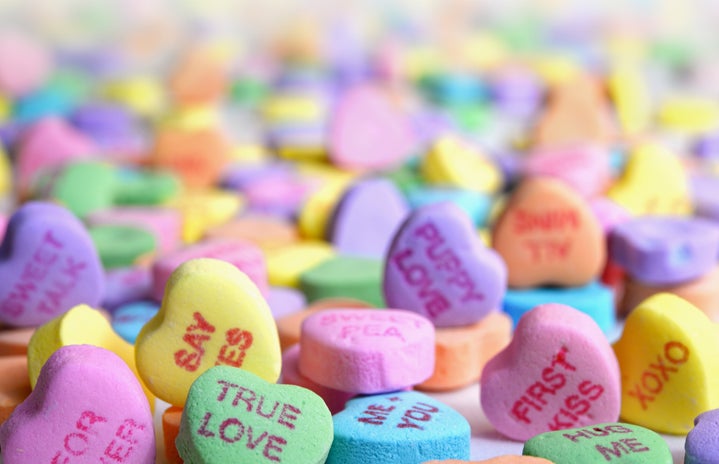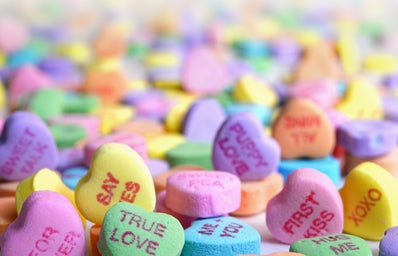When it comes to Valentine’s Day, of course, the theme is love. The entire day is dedicated to celebrating this emotion and the relationships that blossom from it. And it’s an incredibly fascinating emotion. Love can at the same time bring people together while pulling others apart. Love can be a source of comfort in one moment and a source of anxiety in the next. Love can be our greatest motivator or our greatest obstacle. It’s an elusive emotion and yet we so easily catch it.
Love has been extensively explored by just about every human being in any role: literary giants, poets, psychologists, film-makers, politicians, parents, and everyday people like you and me. However, it’s no secret that love is nonetheless confusing. There are so many sides to this emotion, and this is especially clear when we look at songs about love. So is love a game? Is it the best thing to ever happen? Or is it just trouble? Here I will attempt to explain away some of the resounding ideas and effects of love that we often see in our mainstream music lyrics using what our society tends to trust best these days: science.
I touch on you more and more every time
When you leave, I’m begging you not to go
Call your name two or three times in a row
– “Crazy in Love”, Beyoncé
The feeling of attraction is associated with a drop in serotonin levels in the brain. Serotonin is a neuromodulator released by neurons in the brain as well as other cell types elsewhere in the body (including cells of the digestive system). In the brain, serotonin seems to be responsible for regulating mood, among other cognitive functions. When it comes to love, this drop in serotonin levels is often compared to a similar drop seen in people with obsessive-compulsive disorders. This has led scientists to speculate that this may explain the obsessive, maddeningly preoccupying thoughts that are prevalent when you become infatuated with someone, like what is described in the song “Crazy in Love” by Beyoncé.
But when I’m looking at you
I can’t ever be brave
‘Cause you make my heart race
– “One Thing”, One Direction
It’s no wonder that we once thought love originated from the heart because that heart-pounding, nervous feeling is definitely a symptom of love. The chemical responsible for this feeling is norepinephrine, a neurotransmitter that plays a large role in our body’s fight-or-flight response. This neurotransmitter keeps us alert, increases our heart rate (which leads to those flushed cheeks), and elevates our blood pressure — all of which are important when we do need to fight or flight, but are also present when we do fall in love.
You would explain the current, as I just smile
Hoping I just stay the same and nothing will change
And it’ll be us, just for a while
– “Malibu”, Miley Cyrus
Feelings of attachment and closeness are mediated by oxytocin and vasopressin, both of which are neurohormones produced by the hypothalamus and released by the posterior pituitary gland in the brain. Both play important physiological roles (e.g. in uterine contraction, milk ejection, and regulating blood pressure). Oxytocin is also known to provoke feelings of contentment, calmness, and security, which are important contributors to a romantic relationship. Vasopressin, on the other hand, is linked to behaviour that leads to long-term, monogamous relationships. So there you have it, oxytocin and vasopressin are important for reaching that comfortable, content, and forever kind of love found in Miley Cyrus’ “Malibu”.
Cause it’s a beautiful night, we’re looking for something dumb to do
Hey baby, I think I wanna marry you
Is it the look in your eyes or is it this dancing juice
Who cares baby, I think I wanna marry you
– “Marry You”, Bruno Mars
Being love-struck comes with a distinct sense of euphoria and a heightened sense of pleasure. Giddiness and wonder are mixed in there too, similar to what is described in Bruno Mars’ “Marry You”. You can thank the chemical dopamine for that. Aside from its crucial role in controlling movement, dopamine also plays a role in the brain’s reward pathway. More specifically, it is important for associating pleasure with the expected reward. When it comes to love, dopamine helps to make love a more pleasurable experience. This is what motivates you to be with the person you love more since it is perceived as a pleasurable experience.
So, we’ve explored the science behind the lyrics of a few beloved pop songs, and we’ve added a few chemicals to our understanding of how love works. Is that enough to understand this fascinating emotion? In my opinion, although science can explain why or how we might feel the way we do when we’re in love, it doesn’t really tell us what love exactly is. To this end, I think novels, poems, songs, and movies are much better at representing what love really is. After all, those are the mediums that are best at relating emotions to an audience.
Information sources:
The Psych 101 Series: Psychology of Love 101, Karin Sternberg
Love and the Brain, Scott Edwards
Love, Actually: The science behind lust, attraction and companionship, Katherine Wu
The Science of Love, ASAPScience
World’s Most Asked Questions: What is Love?, SciShow
Image sources:


